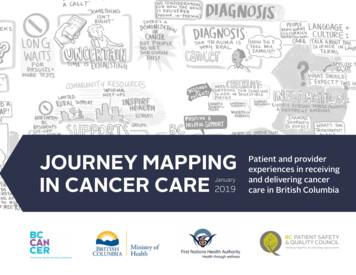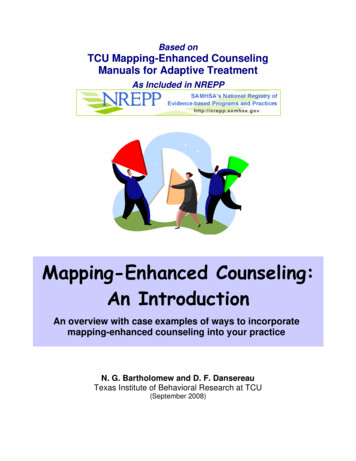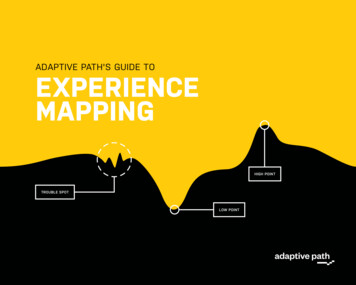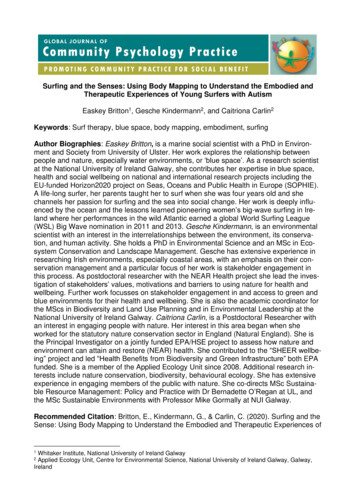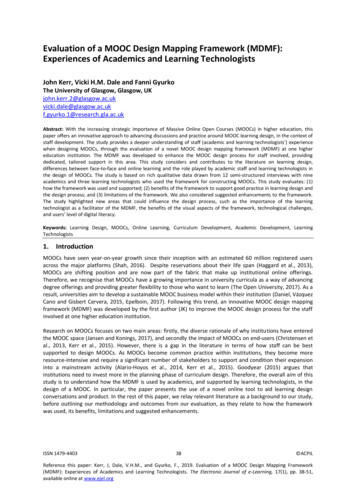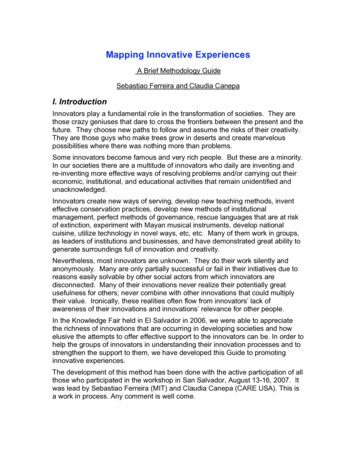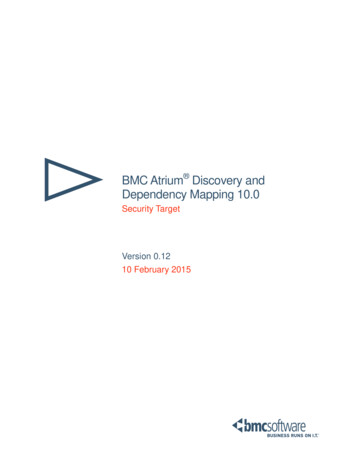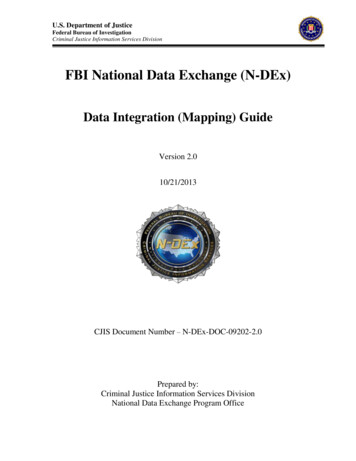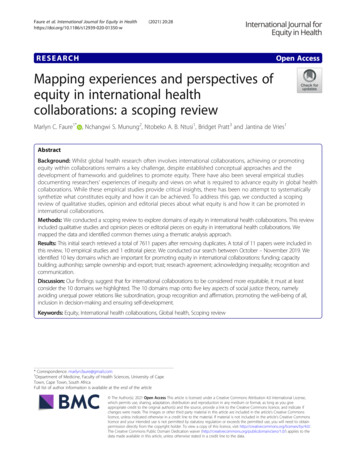
Transcription
Faure et al. International Journal for Equity in 021) 20:28RESEARCHOpen AccessMapping experiences and perspectives ofequity in international healthcollaborations: a scoping reviewMarlyn C. Faure1* , Nchangwi S. Munung2, Ntobeko A. B. Ntusi1, Bridget Pratt3 and Jantina de Vries1AbstractBackground: Whilst global health research often involves international collaborations, achieving or promotingequity within collaborations remains a key challenge, despite established conceptual approaches and thedevelopment of frameworks and guidelines to promote equity. There have also been several empirical studiesdocumenting researchers’ experiences of inequity and views on what is required to advance equity in global healthcollaborations. While these empirical studies provide critical insights, there has been no attempt to systematicallysynthetize what constitutes equity and how it can be achieved. To address this gap, we conducted a scopingreview of qualitative studies, opinion and editorial pieces about what equity is and how it can be promoted ininternational collaborations.Methods: We conducted a scoping review to explore domains of equity in international health collaborations. This reviewincluded qualitative studies and opinion pieces or editorial pieces on equity in international health collaborations. Wemapped the data and identified common themes using a thematic analysis approach.Results: This initial search retrieved a total of 7611 papers after removing duplicates. A total of 11 papers were included inthis review, 10 empirical studies and 1 editorial piece. We conducted our search between October – November 2019. Weidentified 10 key domains which are important for promoting equity in international collaborations: funding; capacitybuilding; authorship; sample ownership and export; trust; research agreement; acknowledging inequality; recognition andcommunication.Discussion: Our findings suggest that for international collaborations to be considered more equitable, it must at leastconsider the 10 domains we highlighted. The 10 domains map onto five key aspects of social justice theory, namelyavoiding unequal power relations like subordination, group recognition and affirmation, promoting the well-being of all,inclusion in decision-making and ensuring self-development.Keywords: Equity, International health collaborations, Global health, Scoping review* Correspondence: marlyn.faure@gmail.com1Department of Medicine, Faculty of Health Sciences, University of CapeTown, Cape Town, South AfricaFull list of author information is available at the end of the article The Author(s). 2021 Open Access This article is licensed under a Creative Commons Attribution 4.0 International License,which permits use, sharing, adaptation, distribution and reproduction in any medium or format, as long as you giveappropriate credit to the original author(s) and the source, provide a link to the Creative Commons licence, and indicate ifchanges were made. The images or other third party material in this article are included in the article's Creative Commonslicence, unless indicated otherwise in a credit line to the material. If material is not included in the article's Creative Commonslicence and your intended use is not permitted by statutory regulation or exceeds the permitted use, you will need to obtainpermission directly from the copyright holder. To view a copy of this licence, visit http://creativecommons.org/licenses/by/4.0/.The Creative Commons Public Domain Dedication waiver ) applies to thedata made available in this article, unless otherwise stated in a credit line to the data.
Faure et al. International Journal for Equity in Health(2021) 20:28Page 2 of 13BackgroundInternational health collaborations have been steadily increasing since the 1990s [1], often bringing togetherstakeholders from high-income countries (HICs) situatedin the global North, where most funding sources are located, with stakeholders from lower- and middle-incomecountries (LMICs) located primarily in the global South.Whilst these collaborations may tackle a range of research questions, they often include questions aboutconditions that primarily affect people living in the global South [2, 3]. Driving this growth in collaborationsare expectations that such collaborations will play a significant role in mitigating global health disparities [4–9].Another driving factor is a “desire to be socially responsible” [10]. International collaboration in health researchmay have the effect of increasing clinical and researchcapacity in global South contexts and afford scientists inresource-poorer countries an opportunity to participatein or lead innovative scientific research and to publish[7, 11, 12].Notwithstanding these potential benefits and drivingfactors, a range of critiques has been levelled against international health collaborations. Such collaborative arrangements have been accused of being exploitative ofSouthern researchers and communities, with some researchers labelling such practices as neo-colonial [13–16].And while many Northern researchers may not set out toreproduce inequalities based on a colonial past, often collaborations have been seen as paternalistic, creating whatOkeke has called, “the little brother effect” [17].To address concerns related to international collaborations re-entrenching unequal relations, several bodies ofliterature have provided guidelines, imperatives and suggestions for equity in international collaboration. Theseinclude substantial conceptual accounts about whatequity is, why it is imperative, and how it can beachieved [18, 19]. They draw on rich literature from political philosophy that explores the concept of equity andsocial justice and identify several components, includingavoiding unfair power relations, recognition, inclusion indecision-making, and rights to self-development and adequate levels of well-being. Social justice means reducingunequal power relations such as subordination, exploitation, exclusion and violence [20–22] and includes recognition and affirmation of group difference [21, 23–25].Three core aspects of misrecognition are: 1) culturaldomination, 2) de-valuing and stereotyping socialgroups, and 3) rendering their knowledge and perspectives invisible [21, 26–28]. Accordingly, recognition encompasses affirmation of group difference, rendering theinvisible visible and demonstrating respect. Social justicealso means ensuring individuals and social groups, including those considered disadvantaged or marginalized,are included in making decisions that have a significantimpact on their well-being [21, 29, 30]. Efforts shouldalso be made to ensure that dominant power hierarchiesare not reinforced, and those considered disadvantagedor marginalized are not included as tokens. Scholarsoften equate fairness with consensual and deliberativedecision-making [21, 31–33]. Social justice further callsfor ensuring self-development (understood as developingand exercising one’s capacities) and human flourishing(understood as achieving an adequate level of well-beingfor all) [21, 29, 34–36]. Philosophers argue for givingsome priority to bringing disadvantaged or marginalizedindividuals and groups/communities up to an adequatelevel of well-being [34, 37, 38].Ethics researchers have applied these and other concepts from the philosophy literature on health and socialjustice to explore what equity means for international research [39–42]. This conceptual work has proposed thatinternational research collaborations should generatenew knowledge to improve the health and well-being ofLMIC populations, particularly those considered disadvantaged or marginalized; foster their and LMIC researchers’ meaningful participation in decision-makingabout its conduct; and build research capacity in LMICs[39, 40, 43]. However, debates continue as to whetherinternational research collaborations even have a responsibility to contribute to justice beyond the micro-level(i.e. achieving a fair balance of burdens and benefits during individual projects). Some scholars have argued thatinternational research collaborations should not be expected to contribute to reducing global health disparitiesand building research capacity, whereas others stronglydisagree [43–45].Additionally, several guidelines and frameworks havebeen developed that seek to promote more equitablecollaborations. These include the “Responsible Conductin the Global Research Enterprise” [46], the MontrealStatement on Research Integrity in Cross-Boundary Research Collaborations [47], the guidelines developed bythe Commission for Research Partnership with Developing Countries [48] and the COHRED Fairness Index forinternational collaborative partnerships [49]. Moreover,there have been several qualitative studies reporting onresearcher’s experiences within international collaborations [4, 50].While these papers provide necessary empirical evidence for what constitutes both inequity and equity, therehas been no systematic attempt to synthesize empiricalstudies in this domain. The absence of such a synthesizedunderstanding challenges researchers’ ability to proactively engage in and understand how equity in researchcollaboration should be promoted. To address this gap,we conducted a scoping review, mapping and synthesizingresearch from qualitative studies investigating dimensionsof equity in international health collaborations.
Faure et al. International Journal for Equity in Health(2021) 20:28AimTo develop, through synthesizing evidence from published articles, key areas considered critical to fosteringequity in collaborations identified by stakeholders involved in international collaborations.MethodScoping reviews are generally used to map emerging evidence relating to broad topics [51–53] and could focuson: synthesizing the available evidence in a field; definingand clarifying concepts and ideas; identifying wheremore information is required or identifying a questionfor a systematic review [51]. For this review, we were interested in synthesizing evidence relating to equity anddeveloping greater clarity on various dimensions considered important for international collaborations to beequitable.Identifying relevant dataStudy selectionThe third step of the framework involves developing andapplying criteria to consistently and transparently selectrelevant studies. In this review, we applied the followingcriteria: studies which reported on a researcher’s or scientist’s perspectives or opinions on what they perceivedmade an international scientific collaboration (in) equitable, or studies which reported on empirical qualitativeevidence about what made international scientific collaboration (in)equitable. Studies which reported on tools,frameworks, guidelines or regulations that could be implemented to ensure equity were excluded. Studiesreporting on any normative or philosophical accounts ofwhat constituted equity in international research collaborations were also excluded (Table 1).Two reviewers (MCF and NSM) applied the selectioncriteria, first at the title and abstract level and subsequently at the level of full-text articles. Each reviewer independently reviewed articles at the title/abstract andfull-text stages. At the title/abstract review stage, articles,where both reviewers agreed, were included in the fulltext search. Where there was a discrepancy, a third reviewer (JDV) adjudicated, and decided if papers shouldbe included for full-text review. For the full-text search,articles where both reviewers (MCF and NSM) agreed,full-text articles were included. A third reviewer (JDV)Page 3 of 13applied the selection criteria to all full-text manuscriptswhere the two reviewers (MCF AND NSM) disagreed orwere unsure.Inclusion criteriaFor empirical studies to be included in this review, theyhad to meet the following criteria: qualitative studies study participants were researchers or thoseinvolved in research investigated experiences, ideas, concepts, valuesrelated to equity within international collaborations.For opinion or editorial pieces, the articles had to havea focus on equity within international research collaborations, particularly describing experiences, ideas, concepts and values relating to equity.Articles which did not meet these criteria were excluded from the review.Mapping the dataOnce studies were selected, the fourth step of thescoping review process is to map or “chart” the data[52]. While there are no commonly agreed methodsfor this step, what is important is that the methodsystematically organizes the data into relevant themes[52, 53] – not dissimilar to how conventional thematic analysis would operate in qualitative studies[54]. We approached this by firstly, extracting publication details such as author institutional affiliationand dates of publication. We then extracted data related to what studies reported as important for creating equitable international scientific collaborations.For this stage of the review, articles were readthrough several times and a thematic coding schemewas developed inductively by one reviewer (MCF) indiscussion with another author (JDV). After themeswere derived and papers coded using broad themes,sub-themes were developed. During each of stage ofthematic development, themes and sub-themes werepresented to two of members of the research team(NSM and JDV) who had also read through includedpapers and could provide feedback on the accuracyof themes.Table 1 Table of search terms based on guidelines by Peters et al. [79]. For full search strategy adapted for each database, pleasesee Appendix 1Population Research Personnel [MeSH] OR Researcher OR researchers OR investigators OR scientistsConceptEthics OR ethical OR equity OR equitable OR equality OR fair OR fairness OR values OR justice OR “social justice”ContextInternational Cooperation [MeSH] OR Cooperative Behavior [MeSH] OR Collaboration OR collaborators OR cooperation OR internationalcollaboration OR decision making OR international scientific collaboration OR international research collaboration [AND] “Empiricalstudies” OR “qualitative research” OR “qualitative methods” OR opinion OR perspective
Faure et al. International Journal for Equity in Health(2021) 20:28Page 4 of 13Fig. 1 Strobe diagram showing flow of searchesResultsOverall findingsSearch resultsMost of the studies included in this review involveda range of participants in the research process,namely: bio-medical and social science researchers;university administrative staff and managers; community members; and government officials. Of the10 empirical studies, three studies included participants from a single country in the global South.The remaining studies (n 7) included participantsbased in the global North and South, with someparticipants being based in both contexts (see Tables 1 and 2 for a summary of demographics of included studies). All papers were published between2003 and 2019.At the level of authorship, six of the 11 first authors were from LMICs, with six out of 10 seniorWe retrieved a total of 7611 results after duplicateswere removed. After screening all papers at the titleand abstract level, 49 papers were selected for fulltext screening. A total of seven papers met the inclusion criteria, with an additional four papers identified for inclusion after searching the bibliographiesof the papers that matched the inclusion criteria. Inaddition to hand-searching, we also, through GoogleScholar and the citation tracking function, checkedfor papers that had cited the papers included in ourstudy but found none. A total of 11 articles were included in the final analysis, with 10 of these beingqualitative studies, and one an editorial piece. (seeFigs. 1 and 2).
Faure et al. International Journal for Equity in Health(2021) 20:28Page 5 of 13Fig. 2 10 key areas which critical for developing equitable international collaborationsauthors being from HICs. See Table 3 for a summaryof authorship demographics.After conducting a thematic analysis for the 11 included papers, 10 themes relating to equity in international scientific collaborations were identified:funding; capacity building; authorship; sample ownershipand export; research agreement; meeting health priorities in Southern-based contexts; trust; acknowledginginequality; recognition of all stakeholders; andcommunication.FundingFunding was a central determinant of equity and was reported on in 6 of the 11 articles included. Participantsdescribed that since research funding primarily originates from the global North, power is therefore locatedwith the Northern partners [2, 55]. This arrangementhas important implications for equity. For example, twostudies reported that their participants, based in the global South, often had little influence on how and wheremoney was spent [2, 56]. Another study reported thatparticipants observed equitable collaborations whenresearchers based in LMICs can apply directly for funding and subsequently approach researchers based inHICs to collaborate [57]. Relating to dependency, participants in one study highlighted that researchers in theglobal South often struggle to identify calls for funding,and have insufficient capacity (particularly with regardto human resources) to develop funding proposals forinternational funding [58]. Another study noted that African researchers typically do not have access to sustainable funding which limits their ability to independentlyraise funds and pursue their own research agendas [3].Participants lamented their own dependency on Northern funders since there was a serious lack of funding forresearch from local governments in the global South [2].Capacity buildingA second key theme that emerged from our analysis wascapacity building, which was identified in 10 out of 11articles. For most studies, capacity building was definedas ensuring that the partner located in the global Southreceived relevant training. Relevant training was considered training related to the current research project and
Faure et al. International Journal for Equity in Health(2021) 20:28Page 6 of 13Table 2 Summary of included studiesFirstAuthorand lastauthorsYear ofTitle of paperpublicationStudy designNumber ofinterviewsor FGDsKinds of participantsLocation ofstudyparticipantsB. Jentsch; 2003C. PilleyResearch relationshipsbetween the South and theNorth: Cinderella and theugly sisters?Case study analysis;interviews2 casestudies; 7interviewsResearchersUnited 12Supporting Southern-led Research: Implications forNorth-South ResearchPartnershipsInterviews12interviewsNurses; doctors; counsellors;information technologypersonnel; laboratorytechnicians; human resourcemanagersUgandaP.Tindana;M. Parker2014Ethical issues in the export,storage and reuse of humanbiological samples inbiomedical research:perspectives of keystakeholders in Ghana andKenyaInterviews and focusgroup discussions44interviews; 6focusgroupsResearchers, fieldworkers;research assistants; laboratorystaff; members of ethicscommittees; directors ofresearch institutions;community representativesKenya and GhanaF.M.2015Okwaro; P.W.GeisslerIn/dependent Collaborations:Perceptions and Experiencesof African Scientists inTransnational HIV ResearchEthnography (in-depthinterviews, focus groupdiscussions, informalchats, and observationswith scientists and otherstaff)29interviews; 6focusgroupsAfrican scientists, laboratorytechnicians, mobilizers,administrators, nurses, andcounsellorsEast AfricaK.Moodley;S. Singh2016“It’s all about trust”:reflections of researchers onthe complexity andcontroversy surroundingbiobanking in South AfricaInterviews21interviews Researchers (bio-medical);biobanking and governanceexpertsSouth AfricaA. Walsh;E. Byrne2016“The way the country hasbeen carved up byresearchers”: ethics andpower in North-south publichealth researchInterviews53interviewsResearchers (bio-medical andsocial science); governmentofficials; NGOsZambia; andNorthernresearchersinvolved researchbased on ZambiaM. Parker;P. Kingori2016Good and Bad ResearchCollaborations: Researchers’Views on Science and Ethicsin Global Health ResearchInterviews22interviewsPrincipal investigators;research funders; networkcoordinators; clinical trialmanagers; epidemiologists;laboratory managers; ITspecialists, and statisticians,clinical researchers andmanagers of researchinstitutionsSouth-East Asia,South Asia, EastAfrica, WestAfrica, Europe,Oceania, andNorth AmericaN.S.2017Munung; Jde VriesEquity in international healthresearch collaborations inAfrica: Perceptions andexpectations of AfricanresearchersInterviews17interviewsPrincipal investigators; coprincipal investigators;research8 AfricancountriesJ.Guzman;E.R.Mendoza2017Ethical challenges forinternational collaborativeresearch partnerships in thecontext of the Zika outbreakin the Dominican Republic: aqualitative case studyInterviews and focusgroup discussions39 (includes Researchers; NGOs; privatebothorganizations; governmentinterviewsofficialsand weembaContemporary issues inNorth–south health researchpartnerships: perspectives ofhealth research stakeholdersin ZambiaInterviews20interviewsPrincipal investigators; projectmanagers; laboratorymanagers; clinical researchers;academic researchers;members of ethicscommittees; governmentofficialsZambiaF. BinkaNorth–South researchEditorialN/AN/AN/A2005
Faure et al. International Journal for Equity in Health(2021) 20:28Page 7 of 13Table 2 Summary of included studies (Continued)FirstAuthorand lastauthorsYear ofTitle of paperpublicationStudy designNumber ofinterviewsor FGDsKinds of participantsLocation ofstudyparticipantscollaborations: a movetowards a true partnership?analyses, initiate and manage the writing and publicationprocesses.which would aid in attracting independent researchfunding in the future [2, 3, 56–61]. Key types of capacitybuilding described included grant writing skills, methodological and analytical skills and formal qualificationssuch as masters or doctoral degrees. One study envisaged capacity building to involve training researchers touse new technologies which would help them performinnovative research that would be internationally recognized [56]. In a different study, capacity building meantincreasing infrastructural support [3]. Specifically, the articles emphasized that researchers based in the Southshould not simply be viewed as ‘sample collectors’.Two studies were critical of traditional notions of capacity building, asserting for instance that the objective ofcapacity building activities should not simply be toupskill researchers but to ensure that over time, Southern researchers come to rely less on the technical assistance of Northern partners to conduct research [3, 59,62]. Importantly, two studies cautioned that capacitybuilding was not only a one-way process where researchers based in LMICs are educated by researchersbased in HICs, but rather that capacity building shouldbe a reciprocal process where both partners learn fromeach other since both partners are contributing differentskills and resources to the project [55, 63]. Conceptualizing capacity building as a unidirectional activity risks obscuring the skills and knowledge of Southernresearchers, while unwittingly propping up Northern researchers as intellectually or academically superior [63].The fifth theme we identified was the importance ofclear research agreements to promote issues of equity.Four of the studies noted that for collaborations to beequitable, details of the collaboration, such as how funding will be spent, division of labour, decision-making arrangements and authorship policies, should be clearlyarticulated at the outset [3, 57, 58, 63]. Studies alsounderscored the critical role of researchers based inLMICs in negotiating fair terms for such agreements[56, 57, 59].Authorship in scientific collaborationsLocal prioritiesThe third emerging theme we identified related toauthorship. Five studies highlighted the importance offair authorship practices [3, 55, 60, 61, 63]. The primaryconcern was that researchers based in LMICs are dulyrecognized – at a minimum, that they should be listedas co-authors, but ideally should be supported to takeon first- or senior author roles. Such a change would involve empowering scientists from the South to leadAn important criticism of international collaborations isthat research priorities in the global South are not takenseriously by Northern collaborators. Three studies reported that international collaborations should consideror focus on local health priorities as key objectives ofstudies as opposed to researchers based in HICs deciding what those objectives should be [3, 55, 61]. Studiesalso described the importance of local communitiesSample ownership and exportAnother theme related to sample ownership, export andsecondary uses of the samples [2, 60, 64]. Participants intwo of the 11 studies articulated concerns that when samples were exported from LMICs for analysis in laboratories in HICs, there is little control over the use of thoseresources and the knowledge generated from those samples [3, 57]. Of particular concern was that once sampleswere only stored abroad, it would be difficult to ensurethat the researchers involved in the initial collection ofthese resources would continue to be involved or recognized in subsequent work or publications emanating outof the research [3, 64]. And this was considered to undermine equity in international research collaborations.Research agreementsTable 3 Breakdown of first and last author by geographical originNo ofarticlesLMICFirst AuthorLast authorFirst authorHICLast authorEmpirical105456Opinion11
Faure et al. International Journal for Equity in Health(2021) 20:28Page 8 of 13benefitting from international collaborations. While thestudy did not articulate what these benefits could be, thearticle described how difficult it was for Southern-basedresearchers to spend money on research, but not beingable to financially assist their research participants whowere often struggling to survive [56].participants felt that recognizing skills, abilities, and localexpertise was an essential element of reducing inequality.In practice, this also entailed acknowledging actors whowould usually not qualify for co-authorship [2, 3, 55, 60,63]. From some studies, this recognition also entailedbroadening the group of people who get recognized andshould include stakeholders such as those collecting samples and data [56]. In line with views on capacity building,one study emphasized the importance of recognizing thelimitations of researchers based in HICs as well [63]. Related to this was the importance of valuing equality. Thestudies described that what often stifles more equitable relationships is when some roles are de-valued, or otherroles receive relatively greater recognition or prominence[56, 63]. Such arrangements “undermine the opportunityfor change when Northern personnel, as ‘capacity providers’ are unable to admit to need, and Southern researchers, as ‘receivers’, are not acknowledged for existingcapacity” [63].TrustTrust was another key relational aspect of developingequitable partnerships. Most notable was the relationshipbetween trust and funding. In one study, the Northernand Southern participants reported that funders tend notto trust Southern researchers to manage funds and preferentially trust Northern partners to handle fund management [55]. Another paper reported that as a result offunding generally being located in the North, Northernpartners often dictate how money is spent, without havingto account to Southern partners [2]. Such issues of mistrust could be bypassed (to some extent) when Southernstaff were managed by Southern researchers and managerswho had the cultural sensitivity necessary to create a cooperative working environment [63]. However, trust oftentakes a long time to build between collaborators, and having open and honest discussions between collaborators isessential for doing so [56]. Additionally, there were twofactors which signalled a collaborator could be trusted.First, it was the reputation “and the absence of undesirablequalities” and second, this was also extended beyond theindividual to include the trust funders placed in institutions where researchers located [56]. Yet trust at the interpersonal level is insufficient to mitigate the asymmetricalpower relations between collaborators that are rooted inuneven international funding arrangements.Acknowledging inequalityStudies also reflected on the importance of acknowledgingthat most collaborations between researchers based inLMICs and HICs are inherently unequal, and it would bedisingenuous to pretend that the inequality did not exist. Forone study, this acknowledgement was about researchers fromboth the global North and South to acknowledge the different capacities each team brings to the collaboration and thelimitations of their contributions [56]. Other studies reflectedon the importance of acknowledging more material andstructural inequalities that are inherent in international collaborations, such as differences in training, exposure to technology, skill sets, and funding and other resources, which isas a result of past and contemporary geopolitical arrangements [1, 2, 55, 58].Recognition of the contribution of all collaboratorsRecognizing the role of various stakeholders contributingto the success of the project was also seen as critical forequity. Five of the included studies reported that theirCommunicationCommunication emerged as another component for creating equitable relationships. Specifically, three studies observed that collaborations should be set up in ways thatallow for open and honest communication between researchers at the outset of the collaboration [1, 2,
rations, particularly describing experiences, ideas, con-cepts and values relating to equity. Articles which did not meet these criteria were ex-cluded from the review. Mapping the data Once studies were selected, the fourth step of the scoping review process is to map or “chart”
